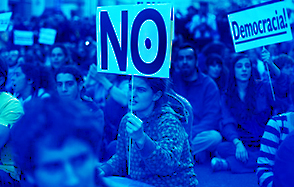


.jpg)
On Monday, 25th August, I was privileged to be in Kyiv for the National Prayer Breakfast of Ukraine. This is what impressed me most during the two-day visit to the country.

The origin story of the church in Europe is a story of the “translation” of the Christian gospel into Europe’s indigenous cultures.

If we are open to hear the voice of the global Church, to receive its help, and to serve it; then Europe still has a key part to play in the evangelisation of the earth.
.jpg)
So much has changed since the last European Parliament election in 2019, but one thing that hasn’t changed is the influence of nationalism. If anything, it is a bigger issue in 2024 than it was in 2019 or back in 2010.

This article seeks to explore the meaning and use of the word polycentric in Christian mission studies today and consider its implications for mission in Europe.
.jpg)
In Europe, we have become used to the arrival of asylum seekers and refugees, most notably when some 2 million people fleeing the conflicts in Syria and Afghanistan. Yet the Ukraine migration crisis has been different.
.jpg)
From 17th to 21st October 2022, 600 Christian leaders from across Asia gathered in Bangkok (Thailand) under the theme of “Rethinking Church and Mission: God’s Agenda for Today”.

The muted voices of the church in Europe were heard more prominently in Lausanne Europe 20/21 than at any other European evangelical gathering, but we still have work to do.

Spain as a model for research.

We find ourselves on a mission frontier, on the periphery of world Christianity. That should cause European Christians to be humble but also hopeful.

Apologetics that is targeted on atheism is only reaching a tiny proportion of Europe’s population. The much greater challenge is reaching the huge number of unbelieving Europeans who are indifferent to Christianity and consider religion an irrelevance in modern life.

Whether Covid-19 will lead to a resurgence of faith in Europe will be seen in years to come but, for now, it has forced churches to innovate in their responses to grief and death and share the hope in Christ beyond the walls of the church.

A new narrative will be required as missionaries return to the new ‘normal’; narratives that define the shape of God’s mission in Europe.

Seventy-five years ago this week, the forces of Nazi Germany formally surrendered to Allied Forces in what came to be called Victory in Europe Day. But the 9th May is also the seventieth anniversary of a three-minute speech by Robert Schuman.

Participation in the Impact Groups of Lausanne Europe 2020 is being opened up beyond the circle of delegates to the gathering.

The impact of demographic change on religious populations and how this could relate to the future of secularisation in Europe.

Putting to one side the hermeneutical questions around the identification of the EU with Bablyon, what is clear is that the demonization of the “other” inspires hatred not love.

Viewing the issues of the referendum debate through the lens of what theologians call “salvation history”, the mission of God to redeem His creation, throws new light on them and provides vital perspective to help us make our decision on the 23 June.

This strategy does not seek out either receptive target groups, or the reproduction of a given church model or denomination; it does not try to impose a common methodology on the churches who adopt it.

Church planters must resist the temptation of assuming that growing churches provide generalizable models for growth elsewhere, and that the absence of apparent success in the present is a sign that God is not working.

Do we demonstrate in our thinking, our words, and our actions that the formation of new communities of Jesus followers is God’s business in which we are privileged to participate, rather than something that we do on his behalf?

Too often church planters focus on the things that they can count easily, even when it blinds them to the more important transformative measures that correlate more closely with the biblical concepts of repentance and discipleship.

The dominant ideology of today’s Europe: growth as our guarantee of existential security in the present and eschatological hope for the future. Christians have an extraordinary message of extraordinary hope at times of crisis.

Las opiniones vertidas por nuestros colaboradores se realizan a nivel personal, pudiendo coincidir o no con la postura de la dirección de Protestante Digital.